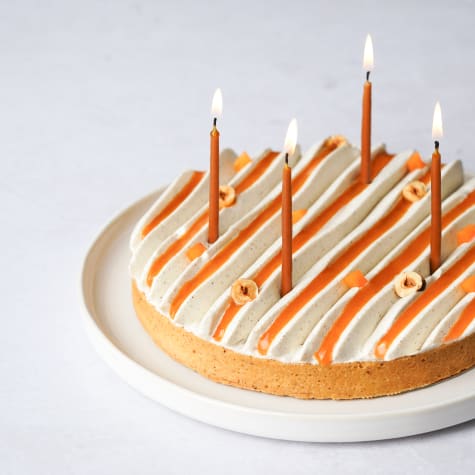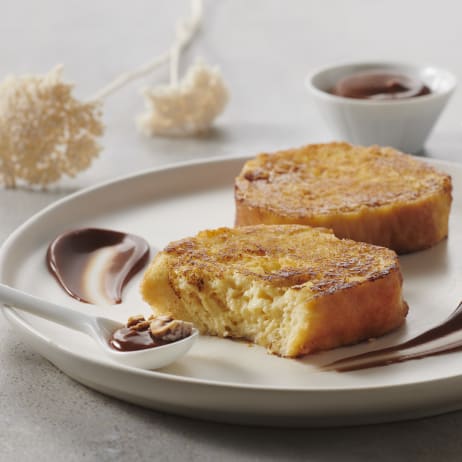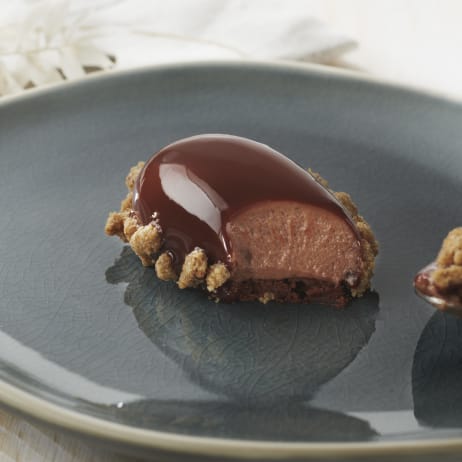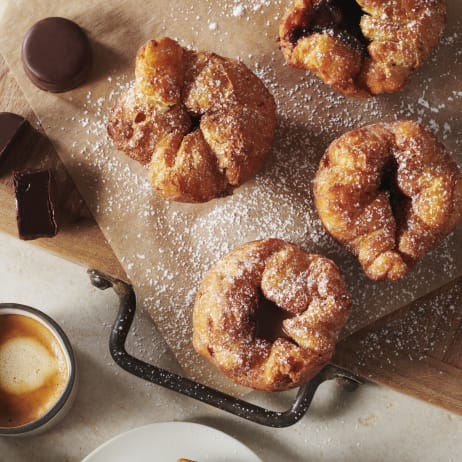You are using an outdated browser. Please upgrade your browser to improve your experience and security.

Apricot Hazelnut Vanilla Tart with Rosemary
Made with Ivoire 35%
AN ORIGINAL RECIPE BY L’École Valrhona
4 stepsRecipe calculated for 2 tarts serving 6 to 8 people each (diameter 20 cm)
Recipe Step by Step
Hazelnut shortcrust pastry
220g flour T55
40g PARIANI hazelnut powder
2g salt
90g icing sugar
60g butter
50g hazelnut oil
50g egg white
Mix the powders with the cold butter cut into cubes and the hazelnut oil. When there are no more lumps, add the egg white. Stop mixing as soon as a homogeneous dough is obtained. Roll out to 3 mm thickness between two guitar sheets or parchment paper. If necessary, put it back in the freezer several times so that the dough cools down and is easier to roll out. Reserve in the freezer.
Lining the tart base
Using a tart ring, cut out the tart base like with a cookie cutter. Next to it, make strips of dough, 3 cm wide, at least as long as the ring. Freeze. Once the dough is frozen, butter the tart ring. Place the shortcrust pastry disc on the baking sheet (with parchment paper). Press down firmly so that the disc touches the sheet. Place the ring around the pastry disc, then place the pre-cut strips of dough inside against the edges. Trim off the excess dough with a knife: press the back of the knife against the ring and then remove the excess dough. Freeze the dough. Once frozen, bake at 150°C (300°F) with fan-assisted heat for 25 minutes. For even baking, you can turn the tray halfway through.
With the leftover shortcrust pastry: make shortbread cookies and bake in the same way.
Hazelnut Chiffon Cake
130g egg whites
50g caster sugar
65g hazelnut oil
130g water
85g PARIANI hazelnut powder
130g flour T55
10g baking powder
260g egg whites
90g caster sugar
70g PARIANI roasted hazelnuts
Whisk together the 130 g of egg whites, oil, water, hazelnut powder, flour, and baking powder. Whip the remaining egg whites to soft peaks with the sugar.
Fold 1/3 of the whipped egg whites into the mixture without caution. Then gently incorporate the remaining 2/3 with a spatula, taking care not to break them. Pour the batter onto a 40 x 60 cm baking sheet. Sprinkle the crushed hazelnuts over the biscuit. Bake at 180°C (356°F) for about 18 minutes.
Turn the biscuit halfway through baking to ensure even cooking. The result is a very airy and flexible biscuit. The offcuts of the chiffon cake can be used for verrines, for example, or frozen for use in another recipe.
Whipped Ganache Ivory 35% Tadoka
410g water
2 Tadoka NOROHY vanilla
12g potato starch or cornstarch
5g gold quality gelatin sheet
266g White chocolate Ivoiry 35%
228g cream UHT 35%
Add the vanilla doses and let melt. Pour part of the hot water over the water-starch mixture. Put everything back into the pot, bring to a boil. Stop the cooking and add the rehydrated gelatin. Pour over the melted chocolate in three parts and emulsify with a spatula.
Finish the emulsion with an immersion blender for 1 minute. Add the cold cream. Blend again for 1 minute with the blender. Allow to crystallize in the refrigerator for at least 12 hours at 4°C. The ganache should be whipped at the time of the tart assembly.
Equivalence with Dulcey 35%: Replace the white chocolate with 281 g of Dulcey 35% and do not add vanilla. The result will be slightly sweeter.
Apricot Pulp with Rosemary
200g ripe apricots
6g fresh rosemary sprigs
20g lemon juice
It is possible not to use rosemary or to replace it with lavender or thyme. You can also roast the apricots with olive oil (or hazelnut oil) and a bit of honey for added indulgence. This will give a sweeter touch to the recipe.
Assembly and finishing

Remove your baked shortcrust pastry.
Cut a disc of chiffon cake slightly smaller than the tart base using the ring. Place the disc inside the tart base.
Cut 2 to 3 apricots into brunoise (small cubes) and then distribute them evenly over the chiffon cake. Whip the ganache: using a stand mixer, whip at medium speed until it reaches a consistency thick enough to be piped.
Add some of the whipped ganache over the biscuit and apricots, and smooth it to the level of the tart edge with a spatula. The goal is to have a smooth and flat surface to facilitate piping.
Pipe the whipped ganache using a small Saint Honoré nozzle, making stripes with the tip pointing upwards. Put the apricot pulp in a piping bag, cut the tip to have a fairly fine hole.
Pipe the apricot pulp between the stripes of whipped ganache, either on every stripe or every other stripe according to your preference.


